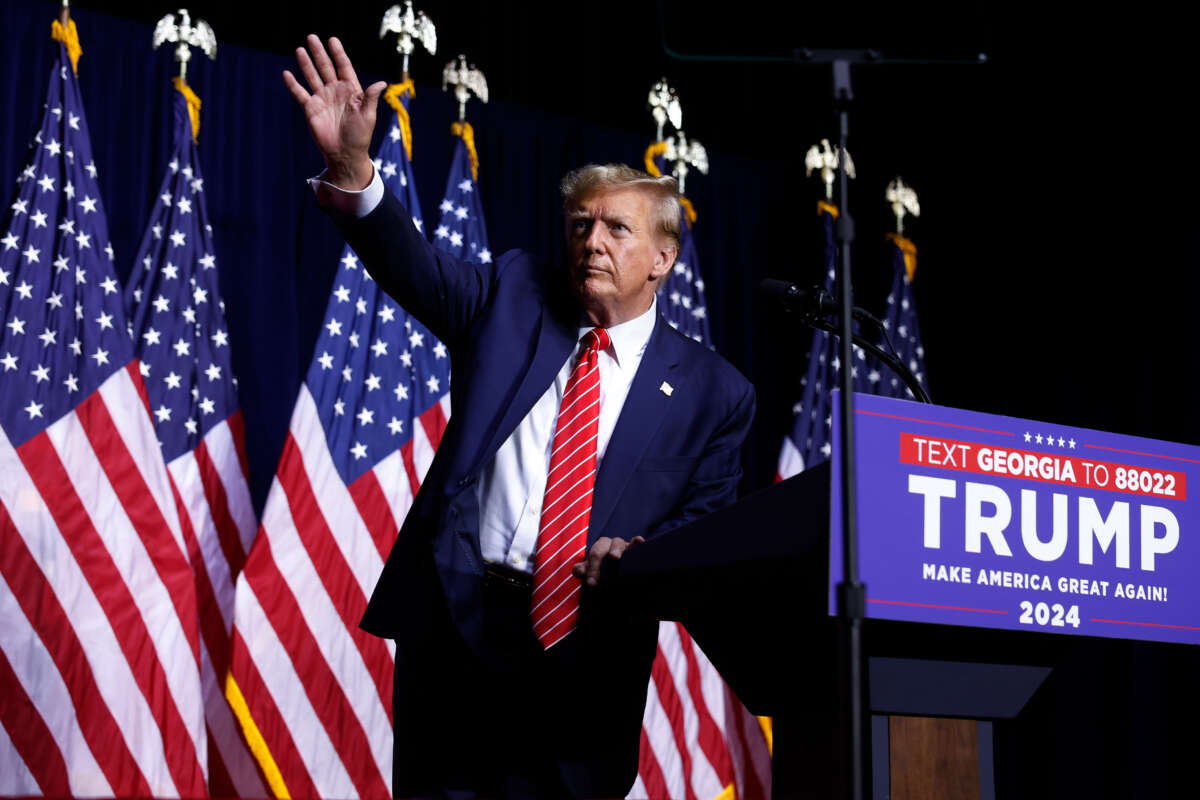Support justice-driven, accurate and transparent news — make a quick donation to Truthout today!
A Georgia judge has dismissed several indictment charges against former President Donald Trump and his allies in the Fulton County racketeering case against them.
Most of the 41 indictments remain intact. However, Georgia Superior Court Judge Scott McAfee, the presiding judge in the case, has dismissed six charges relating to Trump and his allies allegedly attempting to coerce state election officials to violate their public oaths.
That includes charges relating to Trump’s infamous phone call to state officials following his loss in the 2020 presidential election in Georgia, in which he attempted to get Secretary of State Brad Raffensperger to “find” enough votes to overturn his loss in the state to President Joe Biden.
“So what are we going to do here, folks? I only need 11,000 votes. Fellas, I need 11,000 votes. Give me a break,” Trump said on that phone call, threatening Raffensperger and his lawyer with a “big risk” legally if they didn’t comply.
It’s illegal under Georgia state law to coerce, command or otherwise try to get state election officials to engage in election fraud. However, McAfee wrote in his order that prosecutors weren’t specific enough in detailing how the actions of Trump and his allies were illegal.
McAfee didn’t say that Trump couldn’t be charged — indeed, he recognized that Fulton County District Attorney Fani Willis and her office provided plenty of examples of Trump’s illicit actions. However, the charges had to include specific statutes or constitutional provisions that were violated in Trump’s attempts to coerce election officials to do his bidding.
“As written, these six counts contain all the essential elements of the crimes but fail to allege sufficient detail regarding the nature of their commission, i.e., the underlying felony solicited,” McAfee wrote in his order. “They do not give the Defendants enough information to prepare their defenses intelligently, as the Defendants could have violated the Constitutions and thus the statute in dozens, if not hundreds, of distinct ways.”
Barb McQuade, a University of Michigan Law professor and legal analyst for NBC News, elaborated on McAfee’s ruling, writing in a post on X that:
Dismissal of 6 of the 41 counts in Georgia are based on the way they were worded, not any exoneration of defendants’ conduct. Willis can fix the flaw with a new indictment if she chooses, but might prefer to avoid the delay that would bring.
McAfee gave Willis’s office options for responding to his order, stating that the charges could be renewed in a separate grand jury indictment order in the near future if she still wanted to pursue them. Willis also has the ability to appeal McAfee’s order.
While the charges relating to Trump’s efforts to coerce election officials have been dropped for the time being, the remaining racketeering charges are intact.
“Crucially, [McAfee] pointed out that his ruling doesn’t apply to the corresponding conduct alleged in the racketeering charge. That’s one of the reasons that his ruling doesn’t doom the case,” MSNBC legal blog writer Jordan Rubin wrote.
McAfee’s action on Wednesday is being viewed as a huge win for Trump. It reduces the number of charges he faces, including some of the most damning that showcased his attempts at election subversion in the weeks following his election loss. It also presents the possibility that Trump’s potential trial could be delayed, perhaps beyond the 2024 presidential election.
Trump faces dozens of indictments in three additional criminal cases, including two federal cases relating to his retaining classified government documents at his Mar-a-Lago residence beyond his presidency and his attempts to overturn the 2020 election. Both of those federal cases have been delayed or may potentially face delays due to the Supreme Court agreeing to hear an appeal by Trump regarding his claims of presidential immunity. The fourth case, regarding a set of charges in New York state relating to his hush money payments to hide an extramarital affair, is scheduled to go to trial later this month, although Trump has recently made claims of presidential immunity to delay that case as well.
Speaking against the authoritarian crackdown
In the midst of a nationwide attack on civil liberties, Truthout urgently needs your help.
Journalism is a critical tool in the fight against Trump and his extremist agenda. The right wing knows this — that’s why they’ve taken over many legacy media publications.
But we won’t let truth be replaced by propaganda. As the Trump administration works to silence dissent, please support nonprofit independent journalism. Truthout is almost entirely funded by individual giving, so a one-time or monthly donation goes a long way. Click below to sustain our work.
